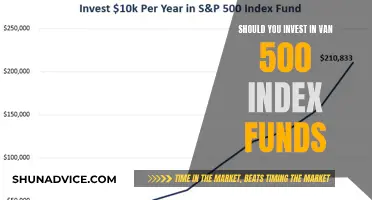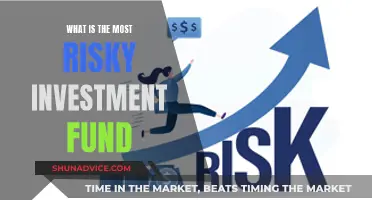
Michael Burry, the founder of Scion Asset Management, is a well-known figure in the investing world, thanks to his successful prediction and profiting from the subprime mortgage crisis of 2007-2008. His story was even featured in the book and movie The Big Short. So, how can you invest in his fund?
Scion Asset Management, founded in 2013, is a private investment firm that provides advisory services to investment funds rather than managing money for individual clients. The firm has a small number of clients, including four investment funds and various private investment funds. While the minimum investment amount for a separately managed account is not specified, the firm generally requires a $1.5 million minimum investment for its private investment funds.
The firm's investment philosophy is rooted in fundamental research, seeking out undervalued securities, and aiming for long-term capital appreciation. They employ a range of investment strategies, including investing in equities, exchange-traded funds (ETFs), government securities, corporate debt, and derivative instruments.
If you're interested in investing with Scion Asset Management, you can either visit their office in Saratoga, California, or set up an appointment with a firm representative by calling (408) 441-8400.
It's important to note that investing in any fund, including Michael Burry's, carries risks, and it's always advisable to conduct your own research and carefully consider your financial situation before making any investment decisions.
| Characteristics | Values |
|---|---|
| Investment philosophy | Value investing, focusing on undervalued and distressed securities |
| Investment strategy | Fundamental analysis, including financial metrics and ratios, and qualitative factors |
| Key financial metrics | Price-to-Earnings (P/E) Ratio, Price-to-Book (P/B) Ratio, Debt-to-Equity (D/E) Ratio, Free Cash Flow, Operating Margin, Profit Margins, Return on Equity (ROE) |
| Portfolio size | Small portfolio of 10-15 stocks |
| Notable holdings | Alibaba Group, JD.com, HCA Healthcare, Citigroup, Cigna Group, Activision Blizzard, Kraft Heinz, Shift4 Payments, Molina Healthcare |
| Investment sectors | Consumer cyclical, healthcare, financial, technology |
| Investment approach | Contrarian, long-term perspective, focus on quality over quantity, diversification, risk management |
| Fees | Management fee of up to 2% annually, incentive allocation/performance-based fee of up to 20% of account appreciation |
What You'll Learn

Buy the same shares as Michael Burry, in the same proportions
Michael Burry is an American investor and hedge fund manager, famous for betting against the real estate market in 2008, as depicted in the film 'The Big Short'. He currently runs Scion Asset Management, a hedge fund with over $100 million in assets under management.
As of Q2 2024, Burry's portfolio consisted of only 10 holdings, with a total portfolio value of approximately $52.5 million. This represents a significant reduction from previous quarters, indicating a strategic consolidation, with Burry focusing on fewer, high-conviction investments.
- Alibaba Group Holding (BABA): 21.26% of the portfolio.
- Shift4 Payments (FOUR): 13.97%.
- Molina Healthcare (MOH): 13.89%.
- Baidu (BIDU): 12.36%.
- JD.com (JD): 12.31%.
- Hudson Pacific Properties (HPP): 10.49%.
- RealReal (REAL): 6.08%.
- American Coastal Insurance (ACIC): 5.06%.
- Olaplex Holdings (OLPX): 2.92%.
- BioAtla (BCAB): 1.66%.
Please note that Burry's portfolio is subject to change, and you should conduct your own research or consult a financial advisor before making any investment decisions.
Equity Index Funds: A Beginner's Guide to Investing
You may want to see also

Invest in undervalued companies with a margin of safety
Michael Burry is a value investor who developed his investing style based on the book Security Analysis by Benjamin Graham and David Dodd. The key component of Burry's investments is a margin of safety. In fact, he has said, "All my stock picking is 100% based on the concept of a margin of safety."
A margin of safety is the difference between a company's stock price and its intrinsic value. The idea is that if a company is worth more than its current stock price, it's a safe investment because the price will eventually rise to match its value.
Burry's investment strategy is grounded in fundamental analysis, which involves a thorough examination of a company's financial statements, market position, competitive advantages, and future prospects. He looks for discrepancies between a company's stock price and its intrinsic value, often focusing on distressed or misunderstood companies that the market overlooks.
- Focus on undervalued companies: Seek out companies that are trading below their intrinsic value. Look for stocks with low price-to-earnings (P/E) ratios relative to their industry peers or historical averages, as this can indicate that they are undervalued. A low P/E ratio means you are paying less for each dollar of earnings.
- Conduct thorough research: Burry emphasizes the importance of diligent research and independent thinking. Dig deep into a company's fundamentals and thoroughly understand the industry in which it operates. Identify undervalued assets that the market has overlooked.
- Consider qualitative factors: In addition to quantitative metrics, Burry also takes into account qualitative factors such as the quality of a company's management team, its competitive advantages, market position, industry dynamics, and potential regulatory impacts. These factors can affect a company's intrinsic value.
- Long-term perspective: Burry takes a long-term view on investing. He seeks investments with strong long-term potential, even if short-term market conditions are unfavourable. This approach allows him to withstand short-term volatility and focus on the underlying value of the investment.
- Effective risk management: Conduct a thorough analysis of potential risks before making investment decisions. Assess the financial health, market position, and intrinsic value of potential investments to protect your capital and maximize potential returns.
- Look for stable businesses: Value companies tend to be established, mature businesses with a history of profitability. They often have consistent cash flow and a low P/E ratio. Examples include utility companies, traditional banks, and some old-school industrial giants.
- Protect your investment: The margin of safety serves as a buffer against market volatility and potential losses. It ensures that you don't overpay for a stock and provides peace of mind during market downturns.
- Selective investment: Burry tends to be selective about his investments. He prefers to make every investment count with a portfolio of carefully chosen good value stocks that all have a margin of safety.
- Contrarian thinking: Burry is known for his contrarian views and willingness to go against the crowd. He believes that the market is not always efficient and can be driven by irrational behaviour. By taking contrarian positions, he aims to identify investment opportunities that others may have overlooked or undervalued.
- Focus on macro trends: Pay attention to macroeconomic trends and their potential impact on the financial markets. Identify broader economic shifts that can create investment opportunities and position your investments accordingly.
Small-Cap Growth Funds: Smart Investment, Big Returns
You may want to see also

Diversify your portfolio
Diversifying your portfolio is a crucial aspect of investment. Michael Burry, the founder of Scion Asset Management, is known for his ability to identify undervalued investment opportunities worldwide. Here are some ways you can diversify your portfolio, drawing inspiration from Michael Burry's investment strategies:
- Look for Undervalued Assets: Michael Burry is a strong advocate of value investing. He seeks out undervalued securities, often focusing on distressed or misunderstood companies that the market overlooks. By investing in these undervalued assets, he aims to generate substantial returns as the market recognizes their true worth. This strategy requires thorough research and a deep understanding of financial metrics and ratios.
- Explore Different Sectors and Markets: Burry is willing to invest in various sectors and markets, including consumer cyclicals, healthcare, financials, and technology. He looks for value anywhere and everywhere, from small-cap stocks to international markets. His portfolio has included investments in Chinese tech giants like Alibaba and JD.com, as well as companies in the healthcare and financial sectors. By diversifying across sectors and markets, you can reduce the risk associated with concentrating your investments in a single industry or region.
- Consider Different Types of Securities: Scion Asset Management, Burry's firm, implements an investment approach that aims to diversify its clients' portfolios. They may invest in a range of securities, including equities, exchange-traded funds (ETFs), government securities, corporate debt, convertible securities, options, warrants, equity swaps, credit default swaps, and derivative instruments. By allocating your investments across different types of securities, you can further diversify your portfolio and reduce concentration risk.
- Long-Term Perspective and Patience: Burry emphasizes taking a long-term view when investing. He is known for his patience and commitment to his investment thesis, even during periods of market volatility. By adopting a long-term perspective, you can better withstand short-term fluctuations and focus on the underlying value of your investments. This approach aligns with his concept of a "margin of safety," where he seeks to invest in assets with a substantial gap between the current market price and their intrinsic value.
- Fundamental and Technical Analysis: Burry's investment decisions are rooted in extensive research and fundamental analysis. He examines a company's financial statements, market position, competitive advantages, and future prospects. Additionally, Scion Asset Management utilizes both fundamental and technical investment analysis to assess market conditions holistically. By combining these approaches, you can make more informed investment decisions and identify potential opportunities or risks.
Remember, diversifying your portfolio is about reducing risk by spreading your investments across various assets, sectors, and markets. It's important to conduct your own research and carefully consider your risk tolerance, investment goals, and time horizon before making any investment decisions.
Hedge Funds: Why Investors Still Find Them Attractive
You may want to see also

Focus on long-term capital appreciation
Michael Burry, the founder of Scion Asset Management, is a well-known value investor with a unique approach to investing. His investment philosophy is centred around the concept of long-term capital appreciation, which involves seeking out undervalued investment opportunities and holding them for the long term to maximise returns. Here's an in-depth look at his strategy:
Long-Term Capital Appreciation Strategy
Michael Burry's investment strategy is deeply rooted in his value investing philosophy, which focuses on long-term capital appreciation. This means he seeks to identify and invest in undervalued companies with strong fundamentals and hold them for the long term. By doing so, he aims to benefit from the potential upside as the market recognises their true worth. This strategy requires patience and a long-term perspective, as it may take time for the market to reflect the intrinsic value of these investments.
Fundamental and Technical Analysis
To identify undervalued companies, Burry conducts extensive fundamental and technical analysis. He scrutinises financial statements, market position, competitive advantages, and future prospects to assess a company's intrinsic value. He also considers qualitative factors, such as the quality of management, competitive advantages, market position, industry dynamics, and potential regulatory impacts. Additionally, he uses technical analysis to evaluate investment opportunities from multiple angles, including technical and macroeconomic factors.
Margin of Safety
A key component of Burry's investment strategy is the concept of a "margin of safety." He looks for companies trading at a discount to their intrinsic value, creating a buffer against potential losses. By investing in companies with a significant gap between their market price and intrinsic value, he aims to protect his investments from downside risks and maximise the potential for upside.
Diversification and Risk Management
While Burry's portfolio may appear concentrated, he still considers diversification important. He diversifies across sectors and geographies, as evidenced by his investments in Chinese tech stocks, healthcare companies, and financial sector businesses. Additionally, he employs effective risk management strategies by conducting thorough analyses of potential risks before making investment decisions. He also monitors risks affecting his clients' investments and takes action to mitigate them.
Contrarian Investing
Burry is renowned for his contrarian nature, often going against the crowd. He believes that the market is not always efficient and can be driven by irrational behaviour. By taking contrarian positions, he identifies investment opportunities that others may overlook. His successful bet against the housing market before the 2008 financial crisis is a prime example of his contrarian approach paying off handsomely.
Adaptability and Flexibility
While Burry's core investment philosophy remains grounded in value investing, he has demonstrated adaptability and flexibility in his strategy. He is willing to adjust his portfolio based on changing market conditions and emerging opportunities. For example, his recent focus on Chinese tech stocks showcases his ability to identify value globally and his readiness to invest in sectors that others may undervalue.
In conclusion, Michael Burry's investment strategy revolves around long-term capital appreciation, achieved through a disciplined value investing approach. He identifies undervalued companies, conducts rigorous analysis, seeks a margin of safety, diversifies his portfolio, and embraces contrarian and adaptable strategies. By following these principles, he has achieved remarkable investment success and continues to inspire value investors worldwide.
L&T India Value Fund: A Smart Investment Strategy
You may want to see also

Look for value in small-cap stocks, mid-cap stocks, tech stocks, and non-tech stocks
Michael Burry, the founder of Scion Asset Management, is a well-known investor who rose to fame by shorting mortgage securities ahead of the 2008 housing crisis. He is known for his value investing approach and for taking big market risks.
Small-Cap Stocks
Michael Burry has been targeting small-cap Japanese companies as part of his strategy to focus on international value stocks. Here are some of his picks:
- Altech: Provides mechanics and engineers for hire, with a market cap of $334.34 million and a year-to-date performance of down 1%.
- Sansei: Makes elevators and theme park rides, with a market cap of $195.15 million and a year-to-date performance of down 49%.
- Yotai: Produces materials used in electric furnaces, with a market cap of $129.64 million and a year-to-date performance of down 3%.
Mid-Cap Stocks
While the specific category of mid-cap stocks was not mentioned in my search results, some of the Japanese companies that Michael Burry has invested in could be considered mid-cap, such as:
- Tosei: An "opportunistic player in urban real estate" with a market cap of $578.48 million and a year-to-date performance of up 52%.
- Nippon Pillar Packing: Produces mechanical seals, gaskets, and packing supplies, with a market cap of $254.22 million and a year-to-date performance of down 9%.
Tech Stocks
Michael Burry has shown interest in tech stocks, particularly in Chinese tech companies:
- Alibaba Group Holding Ltd. (BABA): China-based technology infrastructure and marketing firm.
- Baidu (BIDU): The "Google of China", focusing on internet search and digital marketing.
- JD.com (JD): Another China-based technology company.
Non-Tech Stocks
In addition to his tech picks, Michael Burry has also invested in a variety of non-tech stocks:
- Shift4 Payments Inc. (FOUR): A payment processing company, specifically in the hospital and entertainment sectors.
- Molina Healthcare Inc. (MOH): A managed-care services provider based in Long Beach, California.
- Hudson Pacific Properties Inc. (HPP): A real estate company that acquires and develops media and entertainment studios, primarily on the US West Coast, Canada, and the UK.
Liquid Fund Investment: A Beginner's Guide to Getting Started
You may want to see also
Frequently asked questions
Michael Burry is a value investor who seeks undervalued stocks with a margin of safety. He focuses on fundamental analysis, looking for discrepancies between a company's stock price and its intrinsic value. He also considers qualitative factors like management quality and competitive advantages.
Michael Burry's core investment philosophy remains rooted in value investing principles. However, his strategy has evolved to adapt to changing market conditions. For example, he transitioned to a more traditional value investing approach after his successful housing market short. More recently, he has focused on Chinese tech stocks and select healthcare and financial companies.
Michael Burry is well-known for his bet against the housing market before the 2008 financial crisis, which was depicted in the book and movie "The Big Short." He also invested in GameStop during the meme stock craze and has held stakes in Chinese tech giants like Alibaba and JD.com.
You can invest like Michael Burry by buying the same shares that he has in his portfolio, using a similar percentage allocation. Alternatively, you can select the most interesting companies from his portfolio and invest in them according to your preferred proportions. Remember to do your own research and assess your risk tolerance before allocating your capital.
Michael Burry's investment journey offers several valuable lessons, including the power of contrarian thinking, the importance of thorough research and due diligence, concentration and conviction in your investments, adaptability to changing market conditions, and maintaining a long-term perspective.







